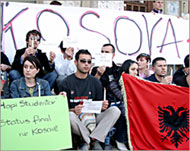Tense calm in Kosovo
In a sign of returning calm in Kosovo, NATO-led peacekeepers have reopened a major road after three days of violence which saw the torching of mosques and churches.

A tense calm prevailed in the province on Saturday as roads that were earlier sealed off by NATO troops and UN police were opened to traffic.
NATO reinforcements were brought in to help police the province and prevent a resurgence of the violence between the ethnic Albanian majority and Serb minority.
Kosovo Prime Minister Bajram Rexhepi said on Saturday that he was “profoundly disturbed” by this week’s inter-ethnic violence that left 28 dead in the province, and announced the creation of a special fund to compensate for damage to Serb property.
“We express our profound disturbance with the number of dead and injured in the last days and we strongly condemn the unprecedented acts of destruction of Kosovo’s cultural and religious heritage,” Rexhepi, an ethnic Albanian, said after an emergency meeting of his cabinet.
Ethnic cleansing
In Belgrade, the Serbia and Montenegro authorities accused the majority Albanians of trying to drive Kosovo’s remaining 100,000 Serbs away and made a veiled threat to use military force to prevent that.
 |
|
Russia has historical and religous |
Russian President Vladimir Putin denounced the Kosovo violence as “ethnic cleansing” of the region’s Serb minority and said tough action was needed to defend them.
A spokesman for the KFOR stabilisation force in Kosovo said no major incidents took place overnight, with NATO-led peacekeepers patrolling the streets in the divided town of Mitrovica, the scene of worst clashes earlier in the week.
“Things are very calm in Kosovo right now,” Lieutenant-Colonel Jim Moran said. “We had a quiet night basically everywhere,” added a United Nations spokeswoman.
A Reuters reporter said NATO peacekeepers, the KFOR, reopened an 80 km stretch of a main road linking Kosovo capital Pristina with Skopje in Macedonia.
Airport re-opened
The road, which runs through some of the flashpoint areas, was sealed off on Tuesday when violence broke out and was now patrolled by KFOR. Pristina airport was reopened to commercial flights as well.
Moran said 1,125 Serbs and other minorities had been evacuated from villages around Pristina and were now sheltered by NATO-led forces and the UN police.
Twenty-eight people, both Albanians and Serbs, were killed in the three days of clashes which saw Albanian and Serb mobs torch houses, mosques, and churches.
Defence Minister Boris Tadic said late on Friday that Serbia and Montenegro did not want to react “with violence to violence” but may have no choice.
 |
|
Many Serb houses were burned |
“I told NATO representatives that Serbia and Montenegro will review policy if the military-technical agreement from Kumanovo is not respected,” he said referring to an agreement in which Belgrade surrendered control of Kosovo to the United Nations.
Serbian intervention
“If our vital interests are endangered we have to take over the responsibility,” Tadic told Serbian state television RTS.
Serb forces were removed from the province after NATO’s 1999 bombing campaign against Serbia, aimed to stop reprisals against Albanians.
A Kosovo government minister said the violence branded by the NATO chief for southern Europe as “ethnic cleansing” would damage the image of the province.
“We were and are against the violence. Kosovo does not need the torching of houses and cultural property,” said Jakup Krasniqi, former spokesman for the rebel Kosovo Liberation Army that fought a separatist war against Yugoslavia in 1998-99 and now minister of public services in Kosovo’s government.
Krasniqi said the outbreak of violence was due to the deadlock on the province’s political status.
“Dissatisfaction has built up because of the lack of progress in Kosovo. For five years Kosovo’s independence has been halted and every process towards independence hindered,” Krasniqi said.
 |
|
Albanian students demonstrated |
Albanian self-determination
The majority Albanians want Kosovo to be independent while the Serb minority want it to remain part of Serbia.
The UN administration (UNMIK) that took control of the province after the 1998-99 Kosovo war has put a hold on both options in an effort to build a multi-ethnic society and democratic institutions before its final status can be discussed.
Serbia‘s new coalition government knows that the Kosovo crisis could push more voters into the camp of the hardline nationalist Radical Party, which already seems well placed to win a presidential election due in May or June.
The likelihood of any unilateral military intervention by Serbia, far less a confrontation with NATO forces, remained extremely small.
But this week’s violence dealt a blow to Western efforts to foster reconciliation between the majority Albanians and Serbs, seen as a necessary step towards resolving its final status.